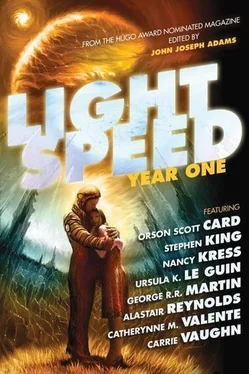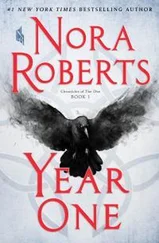John Adams - Lightspeed - Year One
Здесь есть возможность читать онлайн «John Adams - Lightspeed - Year One» весь текст электронной книги совершенно бесплатно (целиком полную версию без сокращений). В некоторых случаях можно слушать аудио, скачать через торрент в формате fb2 и присутствует краткое содержание. Год выпуска: 2011, ISBN: 2011, Издательство: Prime Books, Жанр: Фантастика и фэнтези, на английском языке. Описание произведения, (предисловие) а так же отзывы посетителей доступны на портале библиотеки ЛибКат.
- Название:Lightspeed: Year One
- Автор:
- Издательство:Prime Books
- Жанр:
- Год:2011
- ISBN:978-1607013044
- Рейтинг книги:5 / 5. Голосов: 1
-
Избранное:Добавить в избранное
- Отзывы:
-
Ваша оценка:
- 100
- 1
- 2
- 3
- 4
- 5
Lightspeed: Year One: краткое содержание, описание и аннотация
Предлагаем к чтению аннотацию, описание, краткое содержание или предисловие (зависит от того, что написал сам автор книги «Lightspeed: Year One»). Если вы не нашли необходимую информацию о книге — напишите в комментариях, мы постараемся отыскать её.
www.lightspeedmagazine.com
Lightspeed: Year One — читать онлайн бесплатно полную книгу (весь текст) целиком
Ниже представлен текст книги, разбитый по страницам. Система сохранения места последней прочитанной страницы, позволяет с удобством читать онлайн бесплатно книгу «Lightspeed: Year One», без необходимости каждый раз заново искать на чём Вы остановились. Поставьте закладку, и сможете в любой момент перейти на страницу, на которой закончили чтение.
Интервал:
Закладка:
When everyone died I thought I was sad but I wasn’t sure. There are many Moscows and this is only one Moscow, so why is it important anyway?
But then I remembered Sulyik. There was only one Sulyik who mattered, in the end. That means there will always be only one Sulyik. I will remember him, all of I, for sure.
Sulyik taught me that. Even being qantumikal I can still know things for sure.
Zhenya (your son, all of I, for sure)
VELVET FIELDS
by Anne McCaffrey
Of course we moved into the cities of the planet we now know we must call Zobranoirundisi when Worlds Federated finally permitted a colony there. Although Survey had kept a watch on the planet for more than thirty years standard and the cities were obviously on a standby directive, the owners remained conspicuous by their absence. Since Resources and Supplies had agitated in council for another breadbasket planet in that sector of the galaxy and Zobranoirundisi was unoccupied, we were sent in, chartered to be self-sufficient in one sidereal year and to produce a surplus in two.
It would, therefore, have been a great misdirection of effort not to have inhabited the cities—we only moved into four—so patently suitable for humanoid life-forms. The murals that decorated a conspicuous wall in every dwelling unit gave only a vague idea of the physiology of our landlords, always depicted in an attitude of reverent obeisance toward a dominating Tree symbol so that only the backs, the rounded fuzz-covered craniums, and the suggestions of arms extended in front of the bodies were visible.
I suppose if we had not been so concerned with establishing the herds, generally breaking our necks to meet the colony charter requirements, we might have discovered sooner that there had been a gross error. The clues were there. For example, although we inhabited the cities, they could not be made fully “operational” despite all the efforts of Dunlapil, the metropolitan engineer. Then, too, we could find no single example of the Tree anywhere on the lush planet. But, with R&S on our backs to produce, produce, produce, we didn’t take time to delve into the perplexing anomalies.
Dunlapil, with his usual urbane contempt for the botanical, quipped to Martin Chavez, our ecologist, that the Tree was the Tree of Life and therefore mythical.
“Carry the analogy further,” he would tease Martin, “and it explains why the Tree worshipers”—that’s what we called them before we knew—” aren’t around anymore. Some dissident plucked the Apple and got ’em all kicked out of the Garden of Eden.”
Eden might well have been modeled on this planet, with its velvet fields, parklike forests, and rolling plains. Amid these sat lovely little cities constructed of pressed fibrous blocks tinted in pleasant colors during a manufacturing process whose nature frustrated Dunlapil as much as the absence of Trees perplexed Chavez.
So, suppressing our pervasive sense of trespassing, we moved into the abandoned dwellings, careful not to make any irreparable changes to accommodate our equipment. In fact, the only sophisticated nonindigenous equipment that I, as colony commissioner, permitted within any city was the plastisteel Comtower. I ordered the spaceport constructed beyond a low range of foothills on the rather scrubby plain at some distance from my headquarters city. An old riverbed proved an acceptable road for moving cargo to and from the port, and no one really objected to the distance. It would be far better not to offend our landlords with the dirt and chaos of outer-space commerce close to their pretty city.
We pastured the cattle in neatly separated velvet fields. Martin Chavez worried when close inspection disclosed that each velvet field was underpinned by its own ten-meter-thick foundation of ancient, rock-hard clay. Those same foundations housed what seemed to be a deep irrigation system.
I did ask Martin Chavez to investigate the curious absence of herbivores from a planet so perfectly suited to them. He had catalogued several types of omnivores, a wide variety of fowl, and a plethora of fishes. He did discover some fossil remains of herbivores, but nothing more recent than traces comparable to those of our Pleistocene epoch.
He therefore was forced to conclude—and submitted in a voluminous report with numerous comparisons to nearby galactic examples—that some catastrophes, perhaps the same that had wiped out the humanoids, had eliminated herbivores at an earlier stage.
Whatever the disaster had been—bacterial, viral, or something more esoteric—it did not recur to plague us. We thrived on the planet. The first children, conceived under the bluish alien sun, were born just after we had shipped our first year’s surplus offworld. Life settled into a pleasant seasonal routine: The beef, sheep, horses, kine, even the windoers of Grace’s World imported on an experimental basis, multiplied on the velvet fields. The centenarian crops from half a dozen worlds gave us abundant yields. We had some failures, of course, with inedible or grotesque ergotic mutations, but not enough to be worth more than a minor Chavezian thesis in the record and the shrug of the pioneering farmer. If a colonist is eating well, living comfortably, with leisure time for his kids and time off with his wife on the languid southern seas, he puts up with minor failures and irritations. Even with the omnipresent guilt of trespassing.
I was not the only one who never felt entirely at ease in the pretty cities. But, as I rationalized the intermittent twinges of conscience, it would have been ridiculous to build facilities when empty accommodations were already available, despite their obstinate refusal to work no matter how Dunlapil tried to energize them. Still, we managed fine and gradually came to ignore the anomalies we had never fully explored, settling down to make our gardens and our families grow.
The tenth year was just beginning, with surprising warmth, when Martin Chavez called a meeting with me and Dunlapil. Chavez had even convened it on a Restday, which was annoying as well as unusual.
“Just in case we have to call a meeting of the colony,” he told me when I protested. That statement, on top of his insistence on a meeting, was enough to make me feel apprehensive. Although Martin was a worrier he was no fool; he did not force his problems on anyone unnecessarily, nor was he one for calling useless meetings.
“I’ve an unusual report to make on a new plant growth discernible on the velvet fields, commissioner Sarubbi,” he announced, addressing me formally. “Such a manifestation is not generally associated with simple monocotyledonous plants. I’ve cross-checked both used and unused pastures, and the distortions of the growth in the used fields are distressing.”
“You mean, we’ve imported a virus that’s mutating the indigenous grasses?” I asked. “Or has the old virus that killed off the herbivorous life revived?”
“Nothing like this mutation has ever been classified and no, I don’t think it’s a return of a previous calamity.” Chavez frowned with worry.
“Ah, champion, Martin,” Dunlapil said with some disgust. “Don’t go calling for a planetary quarantine just when we’re showing a nice credit balance.”
Chavez drew himself up indignantly.
“He hasn’t suggested anything of the sort, Dun,” I said, wondering if the urban engineer was annoyed because Chavez might be closer to solving the enigma of the Tree than Dunlapil was the mechanics of the cities. “Please explain, Specialist Chavez.”
“I’ve just recently become aware of a weird evolution from the family Graminaceae, which these plants have resembled until now.” He snapped on the handviewer and projected a slide onto the only wall in my office bare of the ubiquitous murals. “The nodular extrusions now developing in the velvet fields show none of the characteristics of herbaceous plants. No joined stems or slender sheathing leaves.” He looked around to see if we had seen enough before he flashed on a slide of magnified cellular material. “This cross section suggests genus Helianthus, an improbable mutation.” Chavez shrugged his helplessness in presenting such contradictory material. “However, something new is under every sun and we have not yet determined how the usual blue light of this primary will affect growth after prolonged exposure. We might get a Bragae Two effect.”
Читать дальшеИнтервал:
Закладка:
Похожие книги на «Lightspeed: Year One»
Представляем Вашему вниманию похожие книги на «Lightspeed: Year One» списком для выбора. Мы отобрали схожую по названию и смыслу литературу в надежде предоставить читателям больше вариантов отыскать новые, интересные, ещё непрочитанные произведения.
Обсуждение, отзывы о книге «Lightspeed: Year One» и просто собственные мнения читателей. Оставьте ваши комментарии, напишите, что Вы думаете о произведении, его смысле или главных героях. Укажите что конкретно понравилось, а что нет, и почему Вы так считаете.












